Carpenter Museum - June 2012
Reserve Your Tickets Now...
Come to the Annual Rehoboth Antiquarian Clambake, Sun. August 12, 1 p.m.
For over 100 years, we've been waiting for you! If you've been meaning to try our Annual Clambake, this is your year. Experience the same summer event that's been held behind Goff Hall (Blanding Library) for over 100 years. Enjoy tasty clams, fish, sausages, onions, potatoes, stuffing, sweet corn, brown bread and watermelon. Price: $34 per person. Call for reservations: 508-252-4363.
(See Photo 1):
Attention Students! Scholarship Deadline is June 15
Announcing the 2nd annual Rehoboth Antiquarian Society Scholarship which will be awarded to a student accepted to or enrolled in a post-secondary program related to history, museum or library sciences. Applicants from the greater Rehoboth area may apply. Application deadline is June 15, 2012. For more information and an application form, go to our website: www.carpentermuseum.org, or call 508-252-3031.
Rehoboth History Comes Alive for Third Graders
We've been enjoying our young visitors from Palmer River School this year as they take part in our third grade education program. This field trip is especially valuable to these students, since local history is part of the third grade curriculum. The children have the opportunity to try various hands-on activities, including open-hearth fireplace cooking, colonial games, weaving, and making pegs for our post & beam barn.
We are extremely thankful to all our volunteers: Dave Downs, Cathy Potter, Odete Lacourse, Kylee Hitz, Kim Peranzi, Tracy Moran, Marie Sweeney, Jill Brown, Laura Napolitano, Gina Allard, Tina Hagman and Russ Spooner. Special thanks to Rebecca Smith, who organizes and runs this wonderful program, and to John Evans, who volunteers in the barn every day, every year that we have the program. With an entertaining approach, he not only teaches the children about the artifacts in the barn, but also teaches them how to hammer pegs and twist rope with a rope making device that he designed himself.
(see photos 2, 3, and 4)
Note From The Curator By Laura Napolitano
The Carpenter Museum is grateful to Sally Duncan of Mason Street, who recently donated a partial set of china owned by her great-great grandparents Eliza A. (Bailey) and John Martin Horton. The Hortons married in January 1842 and purchased the Dwight Hammond Farm on Pleasant Street. Thereafter the farm was called the Horton Homestead. Sally estimates that her ancestors purchased the china around 1847. The pattern is called "Pelew" and was produced by Edward Challinor, who worked in the Staffordshire potteries area of England. It was discontinued circa 1855. The dishes are made of ironstone with a flow black or mulberry transferware underglaze. The design is characterized as chinoiserie, a style popular during the 17th and 18th centuries that reflected Chinese artistic influences. The dishes all contain a landscape scene with pagodas. Duncan's gift to the Museum consists of components of a China set with five-piece place settings. There are eight tea bowls, seven saucers, nine bread & butter plates, two dinner plates, and a creamer and sugar bowl. They will be placed on view in the Parlor exhibit at the Museum.
(see photo 5)
Remembering Rehoboth School Days:
Retired Educators Recall Their Teaching Years
How have things changed in Rehoboth schools over the past few decades? This was the question posed at the "Teachers Talk" Forum held at Goff Hall on May 6. The program was part of the "Remembering Rehoboth School Days" series of events sponsored by the Carpenter Museum.
Panelists at this event included retired Rehoboth teachers Bill Cute, who served as moderator, Janice Rogala, Kathryn Warish, Nancy Carpenter, and Donna DelPrete, as well as Al St. John, former principal of Palmer River School from 1975 to 2005.
Bill Cute graduated from Dighton-Rehoboth High School in 1969. He began teaching social studies at DR in 1973 and also served as department chair before retiring in 2008. He was also coach of the golf team for 36 seasons. Nancy Carpenter taught at North School in Rehoboth from 1942 to 1955.
Janice Rogala, who taught third grade at Palmer River School between 1967 and 2002, had Mrs. Carpenter as a teacher in grade school. "She is the reason I wanted to be a third grade teacher," Mrs. Rogala said. Donna DelPrete also went to North Rehoboth School as a child. She taught at Palmer River from 1988 until last year. Kathy Warish taught fourth grade at Palmer River from 1975 to 2006.
Here are just a few excerpts from this panel discussion.
How Has Education Changed?
Bill Cute: Think of the state of education when you entered it and when you left. What are the major ways education has evolved and changed?
Nancy Carpenter: When I first started teaching, I could do what I wanted when I wanted. I taught fourth grade at North Rehoboth School. We didn't have as many books as today.
Kathy Warish: Things got more regimented. When Proposition 2-1/2 happened and with liability problems, things changed.
Al St. John: We were in control of what we were doing when I started. Gradually it became following what the state testing program said to do. Rehoboth schools lost out. Also, there have been tremendous changes in technology. Remember mimeograph machines?
Janice Rogala: I started in 1967, in my hometown. It was a way to give back, and I learned from wonderful people. There was a strong feeling of community between the schools and the community at large in my early years of teaching. A lot of that changed after I left what with "no child left behind" and MCAS, and teaching for the test.
Donna DelPrete: The biggest change for me was the inclusion of special needs into the classroom.
Al St. John: Special needs students used to go to a separate classroom. Thanks to teachers like Donna, over a two-year period "special needs" was eliminated and these students were included in a regular classroom. Our school was considered a model for the state of Massachusetts.
Standardized Testing
Janice Rogala: I think that MCAS compares apples and oranges. Naturally a teacher who is teaching a remedial course will have students who do not test as well as students in an AP Physics course, for example, yet the teachers are evaluated on how well their students do on tests.
Kathy Warish: But we have to live with it.
Janice Rogala: We've always had standardized testing. It's what is done with testing now that I have a problem with.
Nancy Carpenter: I didn't pay any attention to standardized tests in my classes [in the 1940s and 1950s] and they all did all right.
Are Kids Different Today?
Donna DelPrete: Kids are kids, but interaction with adults has changed. Kids today are bolder and freer about what they say to the teacher. Then there's all this technology, hand-held games, video games. Kids are obsessed with them. By the time I left, I felt like I had to entertain kids, not just teach them. The teacher's job is a lot harder when you are competing with entertainment.
Janice Rogala: Kids are exposed to a lot more today. The younger kids don't remember the twin towers falling. They only know the world of lockdowns we have today. Kids haven't changed. Their world has changed.
Al St. John: Children seemed more like individuals when I started and more like part of a group when I left. Peer groups are important and everything is so organized. It's changed.
Kathy Warish: If parents allow all that is not so good out there to come into their homes they are doing a disservice to children. They need to monitor more what their kids are doing.
Nancy Carpenter: Everything has changed. Teachers are now told what to do. We used to be able to go to the kitchen and cook when I was teaching the kids about fractions.
What About Parents?
Donna DelPrete: There are some very involved parents in Rehoboth. We have a great PTSA and enrichment programs.
Janice Rogala: It is a partnership. I used to tell parents: "I have your kids for one year only; you have them for life."
Al St. John: There have always been a lot of volunteers in Rehoboth schools; the child saw the value of school.
The complete video of the Teachers Talk forum is available at the Carpenter Museum, along with more extensive interviews with each of these teachers as part of the museum's oral history project on education in Rehoboth.
(see photos 6, 7 and 8)
Glimpse Inside...
The Schoolhouse Cookbook
We've learned a great deal from our oral history project "Remembering Rehoboth School Days". We've conducted a dozen interviews this year! One of the joys of this project has been that we have been given or lent photos and written material that we were not aware existed. One of the books, "The Schoolhouse Cookbook," compiled by the Rehoboth PTA in the 1950s, has been particularly fun because we've been able to share recipes with you. Here is one:
Old-Fashioned Pulled Taffy
3 cups sugar 2 TBS. butter
1/2 cup vinegar 1 tsp. vanilla
1/2 cup water 1/2 tsp. soda
Combine sugar, vinegar, water and butter. Cook without stirring to hard-ball stage. Add vanilla and soda. Mix well and pour into greased shallow pan. When cool enough to handle, pull until light. Twist into a rope of desired thickness. Cut with scissors or cool and break in pieces.
- Randi Ewing
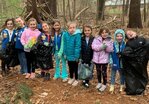

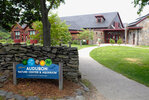

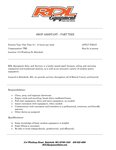

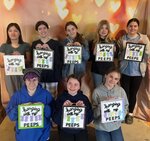
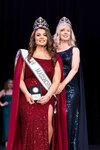
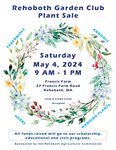

























Comments
No comments on this item Please log in to comment by clicking here